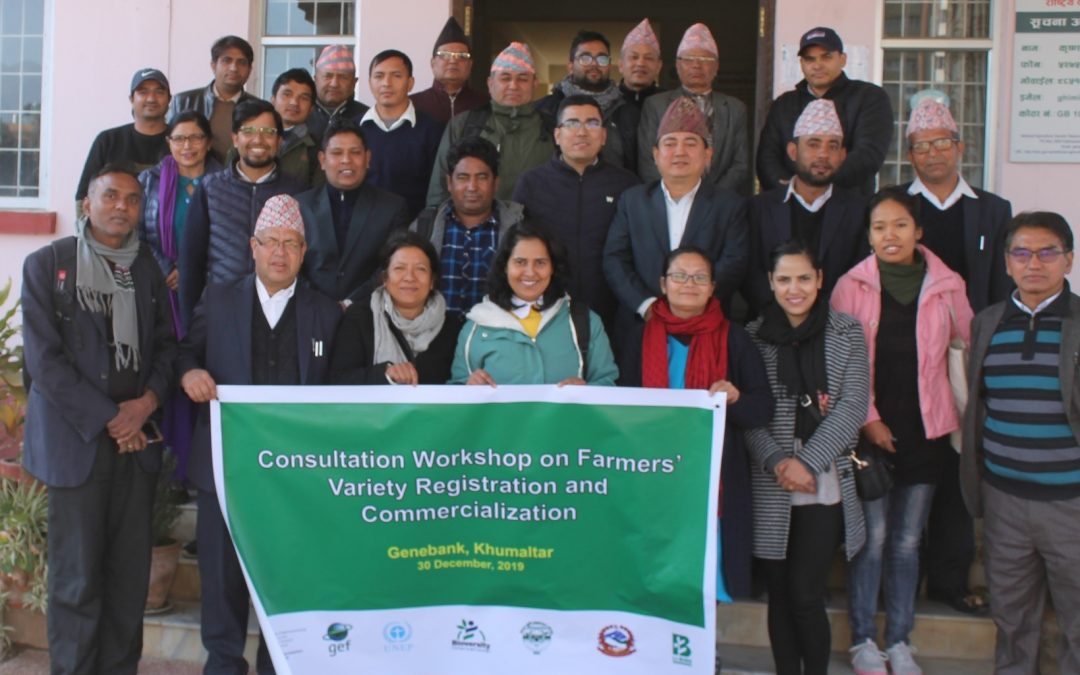By: Pradip Thapa and Devendra Gauchan
Background
A consultation workshop on farmers’ variety registration and commercialization was organized on December 30, 2019 at National Genebank, Khumaltar, Lalitpur. The workshop was organized jointly by National Genetic Resources Centre (NAGRC) of NARC, LI-BIRD and Bioversity International with the funding support of “SDC Seed System Project” and “UNEP GEF Local Crop Project”. The main objective of the workshop was to facilitate farmers’ variety registration and commercialization process. Specific objectives of the consultation workshop are outlined below.
Specific objectives:
- Share progress made and key challenges and issues faced in the registration of farmers varieties
- Sensitize planners, R&D processionals and farmers about the need of farmers’ variety registration and commercialization
- Discuss registration process of local landraces, their commercialization and source seed production and variety maintenance
- Brief stakeholders about the importance of Farmer’s Rights, Plant Variety protection(PVP) and Access Benefit Sharing(ABS) arising from the use of crop genetic resources
Participants
The target participants of this workshop composed farmers and representatives of community seed banks (CSBs), researchers, development professionals, private sectors and policy makers. Some of the participants representing different public, private and I/NGOs sectors were directly involved in conservation and promotion of farmer’s varieties in Nepal. Special invitees of the workshop were members of Variety Release and Registration sub Committee (VRRC) of the National Seed Board including policy makers, researchers, extension professionals, farmers representatives. Beside this, there were participants from different divisions of NARC which are also the members of VRRC including key NGOs (LI-BIRD, CEAPRED). There were altogether 40 participants including 32 male and 8 female.

Fig 1: Madan Thapa, Chief SQCC, facilitating the session

Fig 2: Januka Pandit, DDG DoA facilitating the session
Major Highlights of Program
The first session of the workshop consisted of a technical presentation, where highlights of the progress, background and issues on farmers’ variety registration and commercialization were presented and shared by key members of the project team from the NAGRC (NARC), LI-BIRD and Bioversity International including a thematic presentation from the SQCC. In the first technical session four key technical presentations related to the workshop were made. The main presentation was by Mr. Madan Thapa, Chief of the SQCC about the recent seed policy provisions and relaxed procedure for registration of local landraces especially focusing on ANNEX D provision of Seed Regulation (2013). He informed that there were 35 local landraces registered till now according to ANNEX B but no singe variety is yet registered from ANNEX D provision. Mr. Thapa recommended and emphasized to prepare a short and easy protocol for registration of local landraces and suggested the participants and the project team to provide valuable inputs and comments in the proposed on-going amendment of the Seed Act (1988). The second presentation was made by Dr. Krishna Kumar Mishra (Chief of NAGRC), who highlighted about exploration, collection, characterization and conservation and regeneration process of local landraces in National Gene Bank and focused on how we can maintain source seed production after registration of the varieties. The presentation from LI-BIRD was done by Mr. Dipendra Ayer, who mainly focused on the status of the proposals of the farmers’ varieties that are to be submitted officially soon. He also highlighted key features of six farmers varieties of five traditional crops that are identified and selected by the Local Crop Project for the official registration as well as key challenges and constraints faced in the registration. Dr. Devendra Gauchan, National Project Manager, Bioversity International, Nepal, presented a paper and facilitated the session about the draft rules and regulations related to plant variety protection (PVP), Farmer’s right (FR) and Access Benefit Sharing (ABS) mechanism in Nepal (Figure 3).

Fig 3. Dr. Devendra Gauchan, facilitating the group

Fig 4: Mr. Ram Ekbal Yadav, a farmer leader speaking
The second session was focused on open and interactive discussions among the participants. During the discussion session, Mr. Hasta Bahadur Bista, Chief of the Crop Development and Agrobiodiversity Conservation Centre (CDABCC) of the Department of Agriculture, briefed about the status of marketing and commercialization of local crop in Nepal and committed to promote and mainstream traditional crops and farmers’ varieties in their agricultural development programs. Farmers’ representatives from the project sites’ of Dolakha, Lamjung and Bara participated actively in the discussion and shared their experiences. Mr. Ram Ekbal- a farmer leader from Bara and Chair of Community Seed Bank Association, Nepal (CSBAN) emphasized the need of policy and technical support from government for farmers’ variety registration and commercialization (Figure 4).The workshop was fruitful and successful in terms of sensitizing the key stakeholders for the need of registration and commercialization of farmers varieties. In order to facilitate farmers’ variety registration and commercialization, the participants recommended to develop guidelines for registration, variety maintenance and source seed production of local farmers varieties.
The Local Crop Project is funded by the Global Environment Facility, implemented by United Nations Environment Programme (UNEP) and jointly executed by Bioversity International, National Agriculture Genetic Resources Centre (NAGRC) – Nepal Agriculture Research Council (NARC), the Department of Agriculture (DoA) and LI-BIRD. The Seed System Project is funded by Swiss Development Cooperation (SDC) and being implemented by NAGRC of NARC, LI-BIRD and Bioversity International in Nepal.
